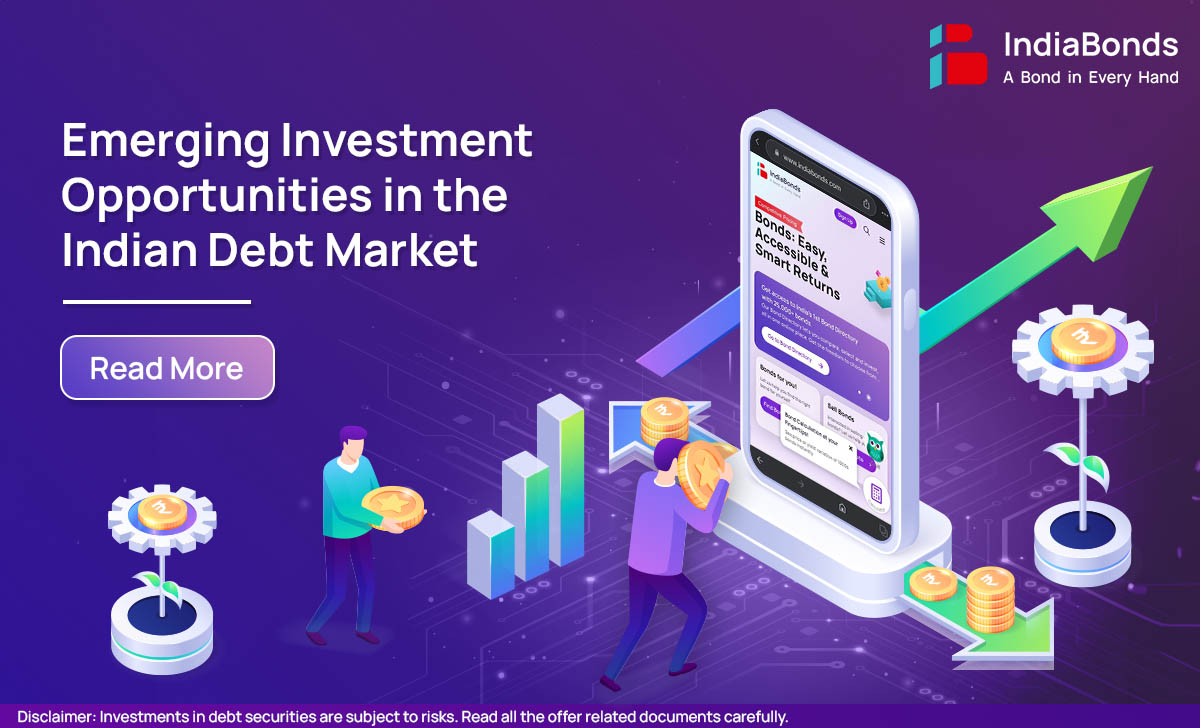Emerging Investment Opportunities in the Indian Debt Market

When the global economies were finally recovering from the pandemic, the repercussions that followed was a burden of a recessionary environment characterized by increased unemployment rates, soaring commodity and oil prices, banking sector strains and escalating geopolitical tensions.
Amidst all of this, India has emerged as a genuine underdog. As major global banking institutions faced crisis in the first quarter of FY23, the Reserve Bank of India (RBI), with its steadfast policies, consistently withstood the challenges. Thanks to this, we were able to effectively mitigate the repercussions of the worldwide economic downturn, which has had ramifications even on the most influential countries.
On the 21st of June 2023, the Sensex reached a record-breaking high of 63,588.31 during intra-day trading. This remarkable growth of India has captured the attention of everyone, and many aspire to be a part of its remarkable journey. As the equity markets thrive, a comparable development is unfolding within the Indian debt market arena.
Bonds, although often overlooked, are an emerging avenue worthy of recognition. The RBI’s Monetary Policy Committee (MPC) in June 2023 projected the real GDP growth for 2023-24 at 6.5%. In terms of inflation, CPI inflation has significantly decreased from 6.4% in February to 4.7% in April 2023. Moreover, in May 2023, the 10-year government security (g-sec) yield exceeded the 7% mark. Essentially, bonds are currently offering inflation-adjusted returns, which were previously a characteristic associated with equities.
The Indian debt market has experienced substantial growth in recent years. Specifically, between March 2018 and the present, the total outstanding bonds have shown remarkable progress, witnessing a significant 77% increase. Notably, government bonds have surged by 85%, while corporate bonds have seen a respectable growth of 53%. Currently, the bond market holds a valuation of approximately $2.34 trillion. Source: CCIL and SEBI
The increasing magnitude of the corporate bond market and the number of issuances serve as significant benchmarks to gauge the effectiveness of government and regulatory development initiatives. Over time, there has been a consistent rise in resource mobilization through the avenue of corporate bonds. Notably, the emergence of entities, such as REITs and InvITs are now participating in bond issuances as well.
As we approach the end of the interest rate hike cycle and witness a substantial rise in yields, bonds are emerging as a compelling investment choice. This is due to the fact that the bonds offer higher returns when investments are made during the peak of the rate cycle. Retail investors have the opportunity to benefit from these heightened rates by locking the current yields. However, this advantageous opportunity will diminish once global central banks begin to slash interest rates. Consequently, those investors who have already invested in bonds will find themselves in a favorable position.
With only a superficial exploration, let us now delve further into the various types of bonds available for investment.
Corporate bonds are issued by organizations to secure capital for various purposes such as working capital requirements or expansion. While corporate bonds may offer the potential for higher yields, they also entail greater risk owing to the creditworthiness of the issuing company. In the Indian debt market space, corporate bonds make up $510 billion, which corresponds to 22% of the total outstanding bonds.
Benefits of investing in corporate bonds
- Potential for higher returns compared to government bonds.
- Tailored investment options with various maturities, coupon rates and credit ratings.
- Potential capital appreciation if the bond’s market value increases over time.
- Liquidity in the secondary market for buying and selling corporate bonds.
- Access to a wide range of sectors and industries, allowing investors to diversify across different economic sectors.
Government bonds, also known as government securities, are issued by the central governments to fulfill their fiscal needs. In contrast, government bonds are widely regarded as one of the safest investment options, backed by the unwavering faith and credit of the government. As of March 31, 2023, the government bonds total $1.83 trillion, accounting for 78% of the total outstanding bonds in the country.
Benefits of investing in government bonds
- Considered low-risk investments due to the creditworthiness of the government, providing a higher level of security compared to other types of bonds.
- Assured and stable income stream through periodic interest payments.
- Helps preserve capital as they have a lower risk of default compared to other investment options.
- Highly liquid, meaning they can be easily bought or sold in the market, providing investors with the flexibility to manage their investments.
Before embarking on any form of investment, it is crucial to have a clear understanding of your financial goals. Ask yourself what your objectives are, whether it’s building a corpus, tax planning, generating inflation-adjusted returns, or simply savings. Every goal can be aligned with a suitable bond. Begin by listing your goals and taking action accordingly.
If you seek higher returns while ensuring the safety of fixed-income investments, corporate bonds may be the ideal choice for you. On the other hand, if your aim is capital preservation and utmost safety for your hard-earned savings, government securities could be the preferred option. By understanding the key differences between corporate bonds and government bonds, you can make informed investment decisions that align with your financial goals and risk tolerance. It’s important to consider factors such as risk, returns, creditworthiness and the overall economic environment when evaluating corporate and government bonds.




Conclusion
Bonds play a vital role, providing security and stability throughout an investor’s journey. In times of uncertainty and a potentially challenging future, our focus shifts to prioritizing safety over maximizing returns, and bonds serve this very purpose. Bonds serve as an anchor within a portfolio, providing guidance to investors amidst the turbulent waters of volatile financial markets, leading them to a more serene and peaceful existence. The Indian debt market plays a critical role in channeling funds and facilitating investment opportunities. Examples such as government securities and prominent corporate bonds illustrate the diversity and potential within the Indian debt market, offering a range of options for non-institutional investors.
FAQs
Q. What are government securities and their various types?
A. Government Securities (G-Secs) are instruments issued by either the central or state governments to fulfill their fiscal requirements. State Development Loans (SDLs) are another form of debt instrument issued by state governments in India to meet their funding needs. Additionally, Treasury bills, or T-bills, serve as short-term debt instruments issued by the central government to fulfill immediate funding requirements. To gain a comprehensive understanding of the various types of G-Secs, we have provided an in-depth analysis in our dedicated blog post. Feel free to explore the topic further by clicking here.
Q. Corporate Bonds vs Government Bonds. Which one is good for me?
A. Choosing between corporate bonds and government bonds depends on individual circumstances, including risk tolerance and financial objectives. To make an informed decision, it is recommended to seek guidance from a financial advisor who can assess your specific needs and provide personalized advice.
Q. What are REITs and InvITs?
A. Real Estate Investment Trusts (REITs) and Infrastructure Investment Trusts (InvITs) are investment vehicles that provide opportunities for investors to participate in the real estate and infrastructure sectors. REITs allow investors to access income-generating real estate assets, while InvITs offer exposure to infrastructure projects. It is crucial for investors to understand the unique features and regulations associated with REITs and InvITs before making investment decisions.
Disclaimer: Investments in debt securities/ municipal debt securities/ securitised debt instruments are subject to risks including delay and/ or default in payment. Read all the offer related documents carefully.













































